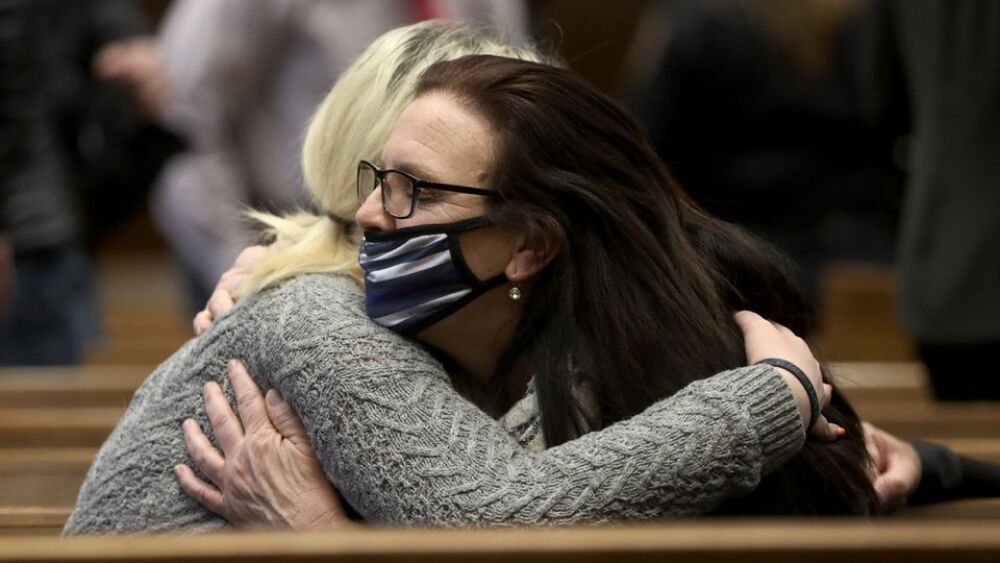By Steve Strunsky
NJ.com
ESSEX COUNTY, N.J. — The New Jersey Supreme Court is scheduled to hear arguments Tuesday in a request for the compassionate release of a prisoner with multiple sclerosis who in 1993 fatally shot a Newark police detective inside an Essex County courthouse.
The case drew national attention at the time, partly because Al-Damany Kamau, 54, committed the execution-style murder of Det. John Sczyrek, 30, with the help of a county probation officer, who smuggled a .357 Magnum handgun into the courthouse for the shooting. Sczyrek was in the courthouse to testify against the shooter’s brother and cousin in a drug trial.
State Superior Court Judge Ronald Wigler denied a petition for Kamau’s early release in February. It had been filed by his sister, who pledged to provide what would amount to hospice care at her home in North Carolina for what his lawyers said would be the few months Kamau had left to live.
Following an emotional hearing that included testimony from the detective’s family, Wigler conceded that the killer had met the necessary conditions under the state’s Compassionate Release Statute — that he was not a threat to the public and that he had a terminal illness.
But Wigler noted that the law states only that judges “may” order the prisoner’s release if those conditions are met, not that they must. He then cited the heinousness of the courthouse slaying in denying Kamau’s release.
Kamau’s public defenders appealed the ruling to the state Appellate Division, arguing that Wigler misinterpreted the statute’s language and used more discretion than the law intended.
The Essex County Prosecutor’s Office opposed Kamau’s release after winning convictions against him in 1995 and two consecutive life sentences without parole for 75 years. Following the appeal, in May, the prosecutor’s office asked the state Supreme Court to hear the case directly, preempting an appellate decision.
Although the prosecutor’s office had successfully fought the request for compassionate release, it also found fault with the judge’s decision, insisting that Kamau had not met the threshold for release under the statute.
Acting Essex County Prosecutor Theodore Stephens said in a May 25 letter to Chief Justice Stuart Rabner and his associate justices that the case presented “questions of great public importance,” with implications for similar compassionate release requests.
The high court agreed and scheduled oral arguments for Tuesday, Sept. 13, which will be streamed live on the court’s website.
https://twitter.com/NJSACOP/status/1003280173297479680
In the same letter, Stephens summarized the main legal points in the case.
“Defendant alleges the judge had no discretion to deny release once he found the statutory requirements were met, despite the Legislature’s deliberate use of the word ‘may’,” Stephens wrote to the justices. “The State, in addition to disagreeing with defendant, asserts that the judge misapplied the statutory standard when finding defendant satisfied the ‘permanently physically incapable of committing a crime if released’ prong of the compassionate release statute.”
Allison Gifford, Kamau’s public defender for his appeal, did not respond to an email on Wednesday.
Kamau, whose legal name was Eddie Lee Oliver Jr. at the time of the shooting, received his second life sentence for wounding Sheriff’s Officer Ralph Rizzolo Jr. during the courthouse attack.
He has been serving his time at South Woods State Prison in Bridgeton, and at Cooper University Hospital in Camden, where his lawyers said in February that he was frequently taken for treatment.
The Feb. 14 hearing where Wigler denied Kamau’s request came after the state corrections commissioner, Victoria Kuhn, certified that Kamau was “medically eligible for consideration for Compassionate Release,” based on the conclusion of two state-appointed doctors that he had no more than six months to live.
The hearing included a statement from the slain officer’s widow, Cheryl Sczyrek, who said she felt her husband’s loss every day, as did their daughter, Shannon, who was 2 1/2 at the time.
Family members asked where Kamau’s compassion was when he snuck up behind the detective in the hallway of what’s now known as Essex County Veteran’s Courthouse and shot him in the back of the head. The hearing was in the same courthouse.
Members of Kamau’s family, including his stepfather, Clarence Philson, a retired Newark police officer who knew the slain detective, also attended the hearing.
Philson said he had compassion for Sczyrek’s family. But he said his stepson was mentally ill at the time — an assertion lawyers had used to spare him the death penalty — and that Kamau was more ill now, mentally and physically.
©2022 Advance Local Media LLC. Visit nj.com. Distributed by Tribune Content Agency, LLC


